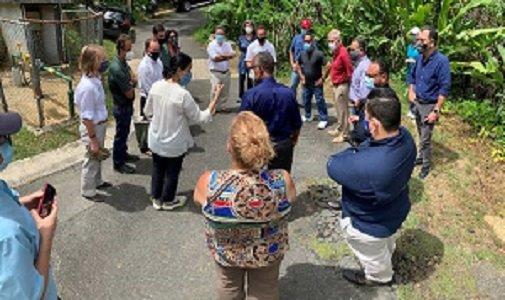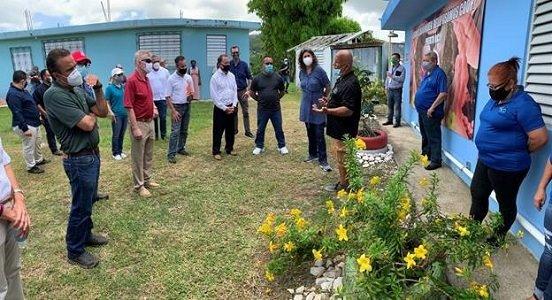News Releases from Region 02
EPA Empowers Rural Community Water Systems in Puerto Rico With Vital Assistance
PUERTO RICO - During a visit today to highlight important U.S. Environmental Protection Agency (EPA) collaboration with Puerto Rico, EPA Associate Deputy Administrator Doug Benevento and EPA Regional Administrator Pete Lopez announced that EPA will provide critically-needed circuit rider technical support to 45 community-owned drinking water systems in rural Puerto Rico. Even before the 2017 hurricanes and subsequent earthquakes, these systems faced severe economic and technical challenges providing water to their communities. The assistance announced today will further empower these systems.
“EPA has had great success with our circuit rider pilots, and we are pleased to expand the Circuit Rider program to assist communities in Puerto Rico,” said EPA Associate Deputy Administrator Doug Benevento. “EPA’s circuit rider program empowers communities by giving them a roadmap to achieve and maintain compliance and provide safe drinking water. EPA is committed to help these systems build capacity and develop programs that address the existing needs and are sustainable in the face of future storms.”
Special Representative for Puerto Rico’s Disaster Recovery Rear Admiral Peter Brown, Secretary of the Puerto Rico Department of Health Lorenzo Gonzalez, Secretary of the Puerto Rico Department of Natural and Environmental Resources Rafael Machargo, U.S. Department of Agriculture’s Rural Development Puerto Rico Director Jose Rivera, members of the Water Coalition, and community leaders joined the group as part of the announcement.

Figure 1-Visit to Community Drinking Water System (Parcelas deCañaboncito Non-PRASA System) with representatives from EPA, Puerto Rico Department of Natural and Environmental Resources, Asocaguas, the Water Coalition, Rear Admiral Brown and the Mayor of Caguas William Miranda Torres.
“These systems have strived for decades to provide safe and reliable water to their communities and EPA’s circuit rider assistance will break that cycle to ensure that systems are not only rebuilt to safe standards, but are also operated sustainably over time,” said EPA Regional Administrator Pete Lopez. “This program gives the power to local decision makers by providing circuit riders who are part trainer and part consultant to troubleshoot issues, increase the technical capacity of local water system operators, and help improve drinking water systems.”
“I want to thank EPA Associate Deputy Administrator Doug Benevento and EPA Regional Administrator Pete Lopez for working with me to get the circuit rider technology to these 45 communities in need,” said Congresswoman Jenniffer Gonzalez-Colón. “By providing these circuit riders as trainers and consultants, local communities will be empowered to utilize the systems to their full capacities and operate in compliance into the future. We must continue to work towards the full recovery of the Island and use the federal funds that we have secured for projects like this one to improve the quality of life of the residents.”
The assistance is part of EPA’s Circuit Rider program. Professional experts will provide technical assistance to 45 of the 240 systems serving about 100,000 Puerto Rico residents in communities across the island that rely on drinking water sources from pumps, wells, and surface water. The communities that own these systems are not part of The Puerto Rico Aqueduct and Sewer Authority (PRASA) and these small community-owned systems are typically operated by residents with limited resources.
Many of the drinking water systems targeted for assistance lack proper sampling for bacteria and experience high turbidity (water cloudiness, a measure of water quality). Under this program, the circuit riders will visit systems and help develop and update, as necessary, a monitoring and compliance plan for approximately 45 Non-PRASA systems that will document the site visit and supply a prioritized list of activities to achieve or maintain compliance. The technical support is anticipated to last 12 to 18 months for each facility, with up to 4 technical assistance visits per facility. The Circuit Rider program supports EPA’s strategic goal of a 25 percent reduction in the number of Community Water Systems that are out of compliance with health-based standards by the end of Fiscal Year 2022.

Figure 2-The Pedro Calixto Non-PRASA System, which serves 1,100 residents, is receiving recovery support from FEMA, COR3, NGOs, the Water Coalition and others.
EPA Associate Deputy Administrator Benevento joined the Mayor of the Municipality of Caguas William Miranda Torres, local government officials, and partners as they visited the Cañaboncito and Pedro Calixto Community Water Systems. These systems serve around 1,500 residents along with small businesses and houses of worship. The EPA Circuit Rider assistance announced today will work in concert with efforts already underway at systems.
Since the beginning of its response to Hurricanes Irma and Maria in 2017, EPA has had an unprecedented engagement to help community water systems recover from disasters. The communities that were visited today are an example of EPA’s work with governmental entities such as the Federal Emergency Management Agency, Core 3 – Recover, Reconstruction, Resiliency, U.S. Department of Agriculture’s Rural Development, Housing and Urban Development, and non-governmental organizations such as the Puerto Rico Community Foundation, Puerto Rico Science, Research and Technology Trust, Por Los Nuestros, Rural Community Assistance Partnership (RCAP)-RCAP Solutions, Natural Rural Water Association (NRWA), Water Mission, Samaritan’s Purse, Project Hope and others to pool resources and coordinate aid to the systems.
Impacts from Hurricanes Irma and Maria in September of 2017, significant earthquakes in early January 2020, the COVID-19 pandemic, and the most recent extreme rain events caused by tropical storm Isaias have adversely affected these disadvantaged communities.
Laying the groundwork for success, EPA previously partnered up with NGOs and volunteers to establish a Water Coalition. Members of the Water Coalition pledged over $10 million of private investments through a Memorandum of Understanding (MOU) with EPA to build capacity, support infrastructure repairs and make rural drinking water systems more resilient to power outages. Through the Water Coalition, EPA facilitates collaboration between federal, local Government of Puerto Rico agencies, and NGOs to help communities be more resilient to hurricanes and storms and provide technical assistance in compliance with local and federal safe drinking water requirements. Under the MOU, NGOs assisted some 30 of the non-PRASA systems to install solar panels and back-up battery storage. During the island-wide electric power outage after the January 2020 earthquakes, these systems were able to continue providing drinking water to their customers.
To view EPA’s Puerto Rico web page, please visit: https://19january2021snapshot.epa.gov/pr
Follow EPA Region 2 on Twitter at http://twitter.com/eparegion2 and visit our Facebook page, http://facebook.com/eparegion2
20-058
